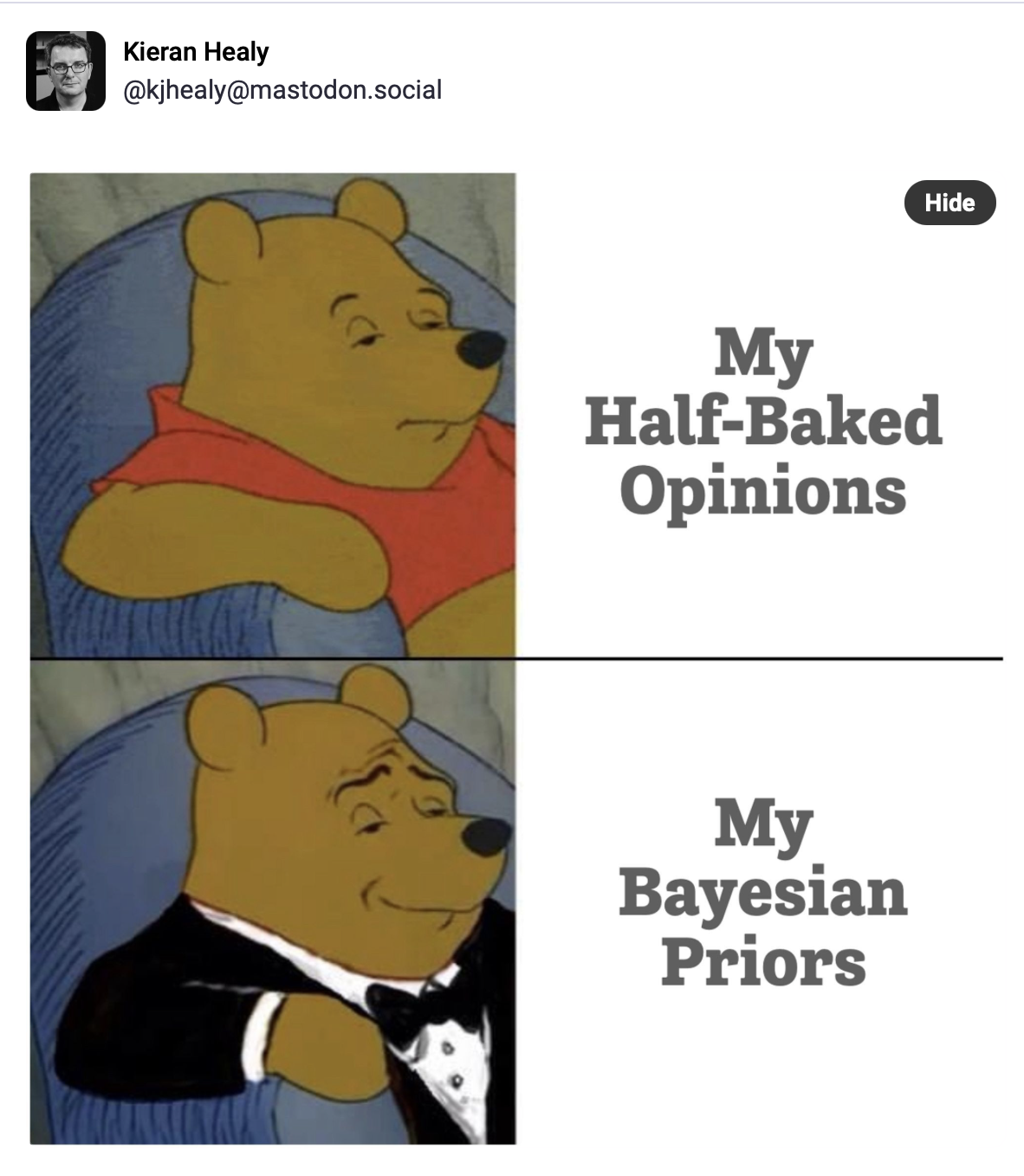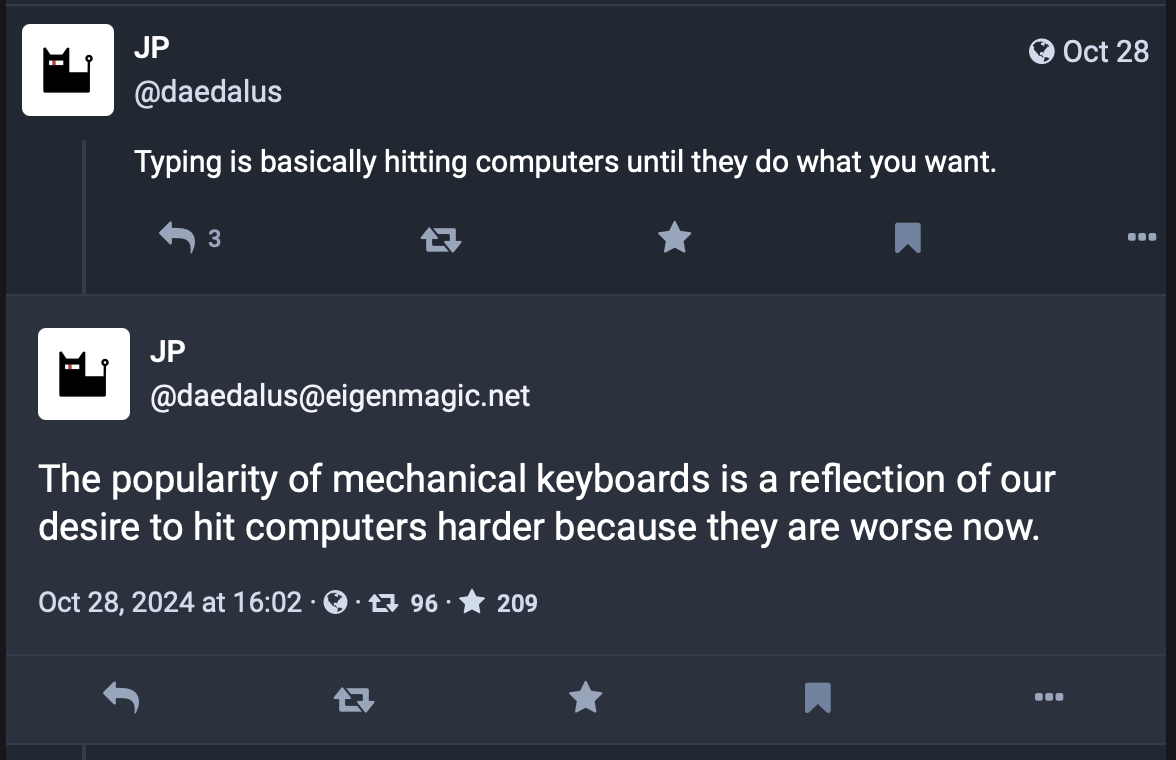It's Mourning in America

I'm not really sure what to say.
But phew, I sure as hell won't turn to ChatGPT to compensate, because my god, I'm grieving – "election grief is real" – and some advanced text predictor that promises to compensate for my "loss for words" is not going to do anyone any good – not me, the super-sad writer, not you my devastated reader, because that's not how writing or feeling works. Outsourcing our activism to autocomplete might've contributed to this mess in the first place.
Ooof, I'm getting ahead of myself... (Or maybe – sigh – I'm looking back on things I've already said.)
I'm mad and I'm sad and I'm disappointed and I'm not at all surprised and I’m scared and I’m resolute.
I won't lie, one of the things that's irked me the most in the last 72 hours or so are those folks saying "it's going to be okay." I know they probably mean well, but frankly, it's not going to be okay. People will suffer, and people will die. "You survived the first Trump presidency," someone had the audacity to tell me. And sure, I did. But hundreds of thousands of people did not. My son did not.
This grief isn't simply the loss of Isaiah then, or the loss of a particular future now; but it is about the erasure of the past – and that sort of erasure, that historical amnesia, as I argued in Monday's newsletter, inevitably leads to feelings of powerlessness and despair.
On Tuesday, Americans chose to forget. And in doing so, Americans chose death and suffering – believing, of course, that the suffering would happen to other people, not to themselves. Americans chose white supremacy. Americans chose authoritarianism.
The peddlers of AI are poised to take full advantage of this, and they will attempt to unleash the techno-fascist future they've being pushing for for years. But we can and we will resist; we can and we will fight.
The fact that we cannot save everything does not mean we cannot save anything and everything we can save is worth saving – Rebecca Solnit
Artificial Intelligence is Anti-Learning: "AI May Ruin the University as We Know It" by Matthew Kirschenbaum and Rita Raley (perhaps the best thing I read this week, in a week, I admit, I have been mostly avoiding the Internet. But still. Read this one, when you’re able to stomach reading things, of course).
What the example of NotebookLM’s promotional campaign demonstrates is the emergence of a new model or template for education, if not for learning itself: a productivity schema ready to be laid across the full spectrum of the postindustrial knowledge economy. It is not difficult to see that in the next phase one can eliminate the lectures and discussions and simply start with the summaries (and eventually the summaries of the summaries), streamed on demand.
"How AI slop undermines our understanding of reality" by Charles Arthur. "Meta AI Introduces Thought Preference Optimization Enabling AI Models to Think Before Responding," via InfoQ. So, like a delay loop, I guess — the performance of deliberation. "AI Will Understand Humans Better Than Humans Do," says Wired. Sure, Jan.
Chronicling Higher Ed Drama: "Jonathan Haidt Started a Social-Media War. Did He Win?" by Stephanie M. Lee. Listen, I'm not going to defend Haidt here, but sometimes you gotta admit that nothing makes academics madder than when one of them writes a bestseller.

Update Windows: "The Cult of Microsoft" by Ed Zitron. One of the arguments that I want to make in my book involves education becoming subsumed under productivity culture – something inscribed through the "productivity suite" of tools that's become ubiquitous at the office™ and at school. The Microsoft-ification of knowledge-work, where we're taught that understanding the world around us comes via the creation of spreadsheets to "process information.” Considering Bill Gates' outsized influence in education (and his promotion of certain kinds of ed-tech), this shouldn't surprise us at all.
Zitron has some very interesting thoughts in this particular newsletter on how Microsoft's workplace culture has become intertwined with a push for a "growth mindset" among employees. "The 'growth mindset' is Microsoft's cult," Zitron argues, "a vaguely-defined, scientifically-questionable, abusively-wielded workplace culture monstrosity, peddled by a Chief Executive obsessed with framing himself as a messianic figure with divine knowledge of how businesses should work." So I guess if Microsoft and Gates strong-armed education and ed-tech into adopting its current productivity mindset, it's only fair that ed-tech boosters reciprocated with pushing a little social-emotional learning bullshit back into the corporate workplace.
Elsewhere in AI Underachievements: Even before the election, "Tech Giants See AI Bets Starting to Pay Off," says The Wall Street Journal. "US regulator rejects bid to boost nuclear power to Amazon data center." Well, the regulatory state was nice while it lasted. "Meta's Nuclear-Powered AI Data Center Plans Reportedly Ruined by Bees." Team Bees, for sure. "Microsoft Provided Gender Detection AI on Accident." "AI overwhelmingly prefers white and male job candidates in new test of resume-screening bias." "Inside the Plan to Use AI to Purge Voter Rolls." "Inside the uncanny world of AI tarot readings." "What if AI Is Actually Good for Hollywood?" asks The New York Times. "Perplexity CEO offers AI company’s services to replace striking NYT staff."

The stakes were always much higher in ed-tech than a lot of its evangelists ever recognized (or cared to admit) – happy, they were, to promote the latest shiny gadgetry without thinking too hard about the dismantling of public institutions, the privatization and individualization of knowledge, the data-fication of students' lives and teachers'/scholars' work, the military origins or the behaviorist control mechanisms that came all bundled neatly with the various software/hardware packages. So here we are. Again.
And it's grim.
Artificial intelligence is a threat to educational institutions – as deeply flawed as these may be – not because it's some incredible technological achievement that's more powerful that the human mind (hahahahahahahahahahahahahahaha); but because it is the manifestation of a series of reactionary political beliefs. AI is inextricably bound up in ideologies and practices that seek to undermine unions, exploit labor, re-inscribe racial and economic hierarchies, and centralize control – of knowledge and knowing ("intelligence" in all its various military and eugenicist histories) – in the hands of a few giant technology corporations. (Folks, that's fascism.)
I know people try very, very hard to excuse, to justify the technologies they use as something else – at best, as politically neutral (perhaps even as politically useful). But I think we need to look at the world that computing has built for us as politically, socially, and intellectually dangerous.
We have to move forward from that realization, letting go this (rather naive) belief that these digital technologies grant us community or solidarity. Community is built on human relationships; solidarity is built on mutual aid. Some of this may be facilitated by technology, sure maybe if you say so – but it's unlikely our current digital technologies are going to grant us much other than the version of "community" as imagined and engineered by the Silicon Valley elite.
Their technologies are not technologies of human flourishing. Their politics are not a politics of human flourishing. I mean, look around you, ffs. I want us to imagine, to build a world for human agency and freedom, not one engineered to achieve some weird vision of computational autonomy.
Spiderman says grief is unexpressed love. It hurts because it matters. This hurts. It matters.
Thanks for subscribing to Second Breakfast. I started this newsletter because I couldn't bear writing about education technology any longer – after the pandemic and Zoom School and the doubling-down on surveillance ed-tech and shitty educational practices; after the publication of Teaching Machines; and mostly, truthfully, after the death of my son took everything out of me. Indeed the original tagline here was "how I get through the mo(u)rning." It's mourning in America once again; perhaps it always has been. And look at me, back at the ed-tech criticism again…
"The best way out is always through" – Robert Frost





